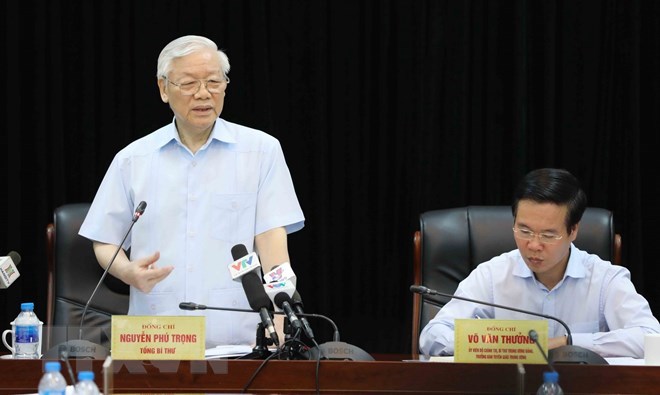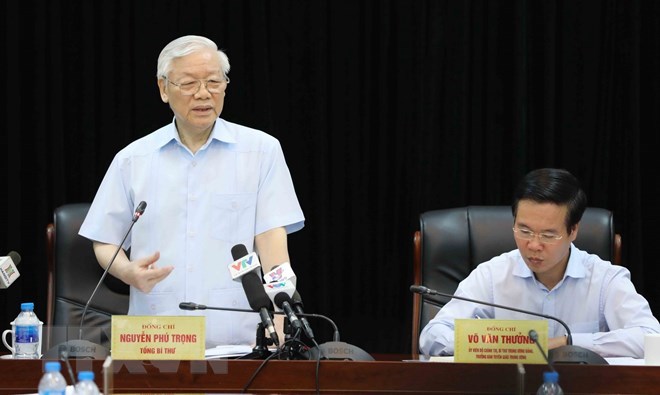



CPVCC General Secretary Nguyen Phu Trong speaks at the working
session (Source: VNA)
The Party chief said as a think-tank of the CPVCC, the Politburo and
Secretariat, the commission plays an important role in Party building in terms
of politics and ideology, dissemination of Party viewpoints and guidelines,
press and publishing, culture and education.
After the 12th National Party Congress and amidst rapid and complicated
developments in the region and the world, the commission and
information-education sector have always closely followed the Party’s
guidelines, working agendas of the CPVCC, Politburo and Secretariat, scored
positive achievements and made important contributions to the country’s common
success, he said.
Agreeing with the commission’s report detailing its seven achievements, seven
shortcomings and nine key tasks for the near future, the leader said the first
task of the commission and the sector is building the Party in terms of
politics and ideology, including Marxism-Leninism and Ho Chi Minh Thought,
adding that theoretical research, education and dissemination are basic and
important issues that decide on orientation to political thought.
According to him, though the press has developed rapidly with rich and
effective contents, communications via words of mouth remain tardy while
management in news on the Internet is limited.
Moreover, the fight against wrongful and distorted allegations by hostile
forces is yet to rally a collective power. He said the fight against
corruption, wastefulness and negative behaviors aims to continue staying on the
path towards the goal of wealthy people, strong country, and democratic, fair
and civilised society.
To that end, the Party must comprise the most outstanding, consistent and
intellectual individuals, thus deserving a leader of the revolution and servant
of the people.
He said information dissemination, building unity in Party and public consensus
is a great responsibility of ideological work, meaning that it is necessary to
grasp public thoughts and aspirations to offer timely explanations.
The Party General Secretary lauded the commission for establishing steering
boards to step up the fight against wrongful and reactionary opinions by
hostile forces, especially amidst the fourth industrial revolution with different
flows of thought and information on the Internet, contributing to firmly
safeguarding revolutionary guidelines, stance and nature of the Party.
The commission needs to train a contingent of officials to meet demand in the
current situation, who are qualified, consistent and absolutely loyal to the
Party, he said.
Party committees and authorities at all levels were also urged to join the
effort.
Speaking at the event, head of the commission Vo Van Thuong said the commission
suggested the Politburo issue the Directive No.05-CT/TW on stepping up the
campaign on studying and following thoughts, morality and lifestyle of Ho Chi
Minh and documents guiding the implementation of the Directive during the
tenure of the 12th National Party Congress.
The commission has also improved the quality of reports submitted to the
Politburo and Secretariat, the efficiency of political ideology and paid
attention to educating Party history in sectors and localities, towards
gradually realising the Resolution of the 12th National Party Congress and
other resolutions of the congresses of Party organisations at all levels.
Positive progresses have been seen in political orientations to press and
publishing activities, culture and arts, thus bringing Party guidelines and policies,
and State laws into life.
Localities have paid heed to the preservation and development of traditional
cultural values, traditional festivals in tandem with tourism attraction and
socio-economic development.
Over the past years, Party and State guidelines and policies have also been
disseminated abroad so that international friends and overseas Vietnamese
communities could better understand about Vietnam.
It directed ministries and agencies to monitor the implementation of
resolutions and directives regarding education-training, science-technology,
environment, health care, population and social welfare.
Information-education units from the grassroots to central level have oriented
public opinions on issues of public concern, fought acts that took advantage of
abusing democracy, human rights and religion to divide the nation and incite
riots.
Source: VNA